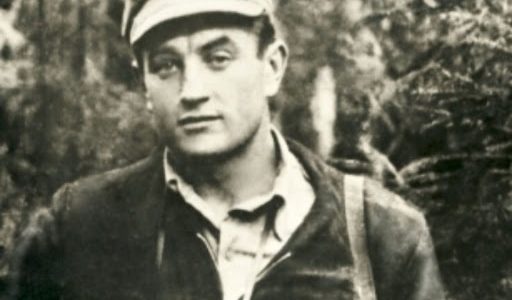A week ago the Lithuanian news channel Info TV aired a program featuring a discussion between Mission to Siberia television program participant and Center for the Study of the Genocide and Resistance of Residents of Lithuania historian Mingailė Jurgaitė, and Lithuanian Jewish Community chairwoman Faina Kukliansky. They discussed the decision by the Lithuanian parliament to declare 2021 the year of Juozas Lukša-Daumantas, who was a member of the Lithuanian Activist Front in 1940 and 1941. The LAF was a pro-Nazi underground militia responsible for most of the atrocities against Lithuanian Jews in the early months of the German occupation in the summer of 1941, when the LAF declared an independent national government with Kaunas as its capital, the so-called Provisional Government.
LAF propaganda took aim mainly at Jews. In Kaunas in 1941 the LAF kidnapped several thousand Lithuanian Jews and their Provisional Government issued orders they be held at a concentration camp to be located at the Seventh Fort in Kaunas.
During the discussion on the television channel, Mingailė Jurgaitė, who works at the Genocide Center and has made the history of the ethnic Lithuanian partisans the focus of her work, said she didn’t know of any connection between Juozas Lukša-Daumantas and the LAF except for a Soviet interrogation document which said he had worked with “activists.” Faina Kukliansky wondered why the draft resolution to name 2021 after the man had no explanatory note explaining why he was being named, something which almost always accompanies draft legislation. Mingailė Jurgaitė didn’t offer an explanation, but instead spoke about presumption of innocence. Asked by the hostess to explain what the controversy was about, Mingailė Jurgaitė mentioned 5,000 accused Lithuanians named on a list compiled by “Crime and Punishment,” apparently a reference to a list drawn up by the late Joseph Melamed. Jurgaitė said the names were listed without specific information and the Genocide Center had worked long and hard to winnow the names down to about 250 “registered” Holocaust perpetrators. Chairwoman Kukliansky said the Genocide Center had ignored all requests from the LJC and other parties for access to their diminished list to no avail. She also attempted to explain to the audience there was no question on Juozas Lukša-Daumantas’s membership in the LAF and that the LAF was responsible for exterminating Jews in Lithuania.
Apparently the Genocide Center believes Juozas Lukša-Daumantas will be accused by the world of being the most infamous perpetrator in the Lietūkis garage massacre in Kaunas and feels it has sufficient evidence to disprove that, without disclosing whatever merit Juozas Lukša-Daumantas has worth naming the year 2021 after him. Mingailė Jurgaitė’s silence on Lukša-Daumantas’s LAF membership seems to indicate the Genocide Center and the Lithuanian Nazi apologists in the Lithuanian parliament are sending up a trial balloon to test the wind of global sentiment on Lithuanian Holocaust criminals, or to provoke open conflict in the international arena regarding Lithuanian partisans complicit in Holocaust crimes now being put forth as national heroes.
The LJC received comments following the broadcast, including the following:
“I watched your discussion with the historian M. Jurgaitė from the Center for the Study of the Genocide and Resistance of Residents of Lithuania on the internet, where she expressed doubt whether Lukša-Daumantas had belonged to the LAF. I admit I am not deeply knowledgeable on this topic and don’t know what sort of organization the LAF in Kaunas was just before the uprising. Nonetheless, the Center’s own internet page under Lukša-Daumantas’s biography says he belonged to the LAF:
http://genocid.lt/UserFiles/File/Atmintinos_datos/2016/201609_luksa_biogr.pdf
“Not even [MP and former Genocide Center historian Dr. Arvydas] Anušauskas has tried to deny Lukša-Daumantas was an LAF member; he only says the man couldn’t have known the ideology of the LAF because he was in prison. Lukša-Daumantas, however, was only in prison for less than two weeks before the uprising, from June 8 [until then]. Perhaps the LAF in Kaunas was different from the LAF in Berlin, but Lukša-Daumantas must have known very well what the ideology of the Kaunas LAF was.
“J. Pajaujas, who seems to have been Lukša-Daumantas’s classmate or fellow student at university, talks about Lukša-Daumantas’s membership in the LAF in his diaries. I haven’t read them and don’t know the details.”
Another correspondent sent us excerpts from the book “Kauno getas (1941-1944 m.)” [Kaunas Ghetto 1941-144] by Genocide Center historian Arūnas Bubnys:
“Lukša-Daumantas was released from prison on June 23, 1941. How did his brother Antanas learn of his release and how did he learn of the rendezvous location? It’s unlikely that he was liberated, that he was released by Soviet authorities who then informed his brother.”
“NKGB interrogation department director Eusėjus Rozauskas, one of the most active of the NKVD agents, suggested initially housing them in the Kaunas prison: ‘Without prospects for evacuating prisoners from Kaunas prison No. 1, to segregate from them the most dangerous and before withdrawing to shoot them.’ At 1 A.M. in the morning on June 23, however, the entire NKVD leadership fled Kaunas.”
“Armed bands of Lithuanians (the so-called Lithuanian partisans, prisoners released from Soviet prison and criminals) subordinate to German security carried out the mass murder of Jews in Vilijampolė [Slobodka] on the night and morning of June 25 and 26. During the pogroms several thousand Jews were murdered (including among the victims women and children). The shooting en masse of Jews began in early July of 1941 at the Seventh Fort in Kaunas.”


